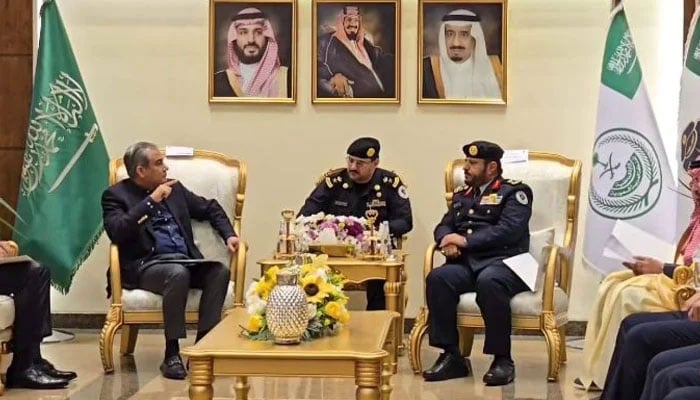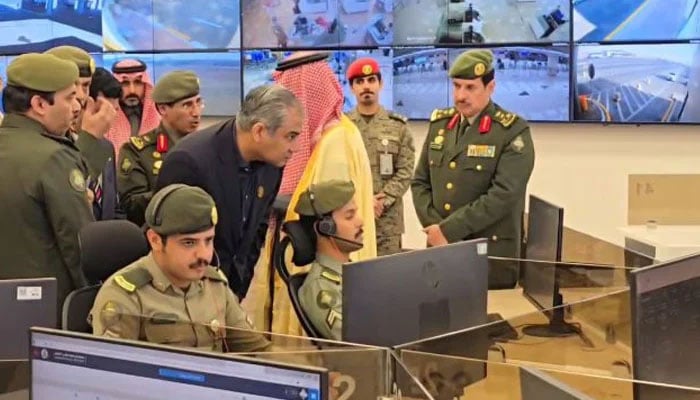In a bid to further strengthen bilateral ties, Pakistan Cricket Board (PCB) Chairman Mohsin Naqvi on Wednesday offered comprehensive support to Saudi Arabia including training of its player and constructing cricket stadiums in the kingdom.
The development came during a meeting between PCB Chairman Naqvi and Saudi Arabian Cricket Federation (SACF) Chairman Prince Saud bin Mishal Al Saud in Riyadh.
Naqvi proposed a player exchange programme to enhance cricket development, suggesting that Riyadh could send emerging players to Pakistan for training.
During the meeting, the PCB chairman, who is also the interior minister, extended an invitation to his Saudi counterpart to visit Pakistan and witness the Champions Trophy tournament matches.
“We are committed to fully supporting Saudi Arabia in cricket development and stadium construction. For every Pakistani, Saudi Arabia is like a second home, and we are delighted to collaborate,” Naqvi stated.
In response, Prince Saud expressed his eagerness to strengthen ties with Pakistan in cricket promotion. Saudi Arabia is actively working on player development and boasts approximately 18,000 cricketers, he added. He highlighted the kingdom’s victory in the Asian Cricket Council Challenge Cup as a testament to their growing cricketing prowess.
He also expressed his desire to work closely with Pakistan to foster cricket growth in Saudi Arabia, underscoring the potential for cooperation between the two nations in the sport.
Later, Naqvi, who arrived in the Gulf country on Sunday, paid a visit to the King Fahd Security College, where he was warmly welcomed by the institution’s Director General, Major General Dr Ali Al-Daij.
During the visit, Naqvi expressed admiration for its cutting-edge educational standards.
He highlighted the significance of the college’s Master’s programme, describing them as well-aligned with modern-day security challenges and advancements.
The minister also praised the institution’s comprehensive five-year strategic plan, commending the leadership of Major Gen Al-Daij for steering the college toward excellence.
In a meeting with the director general, both parties discussed potential exchange programmes to strengthen bilateral cooperation.
They explored opportunities for graduates from both countries to engage in study tours and training sessions.
Naqvi extended an invitation to the Master’s degree graduates to visit Pakistan under the exchange programme and proposed short-term training courses for Pakistani graduates at King Fahd Security College.
Describing the college as “a remarkable example of Saudi leadership’s innovative and futuristic vision,” Naqvi noted its role as a global leader in addressing modern security issues.
Meanwhile, the interior minister paid a visit to the kingdom’s Directorate of Passports, where he was warmly received by Acting Director General Major General Dr Saleh Al-Murabaa.
During the visit, the minister toured various departments, including the modern call center, and reviewed the advanced technologies employed in the Saudi passport system.
He praised the system’s efficiency and commended the efforts to integrate state-of-the-art technology in passport processing and fraud prevention.
The two officials discussed measures to streamline the process of passport issuance and strengthen efforts to prevent forgery.
A comprehensive discussion was also held on the implementation of e-gates to enhance efficiency and security.
Naqvi highlighted the potential benefits of Saudi expertise in improving Pakistan’s passport system.
“The assistance of the Saudi Directorate of Passports can play a pivotal role in making our system more user-friendly and foolproof,” he remarked.
The minister announced plans to establish a call center in Pakistan modelled after the Saudi system to provide better services to citizens.
He also emphasised the importance of cooperation in detecting and preventing document forgery.
“With Saudi Arabia’s support, we can catch offenders involved in passport forgery and document tampering within Pakistan itself,” Naqvi added.
The visit also addressed recent incidents where 3,700 Pakistanis were apprehended at Saudi airports for travelling on tampered passports or fake documents, underscoring the need for stronger preventive measures.




